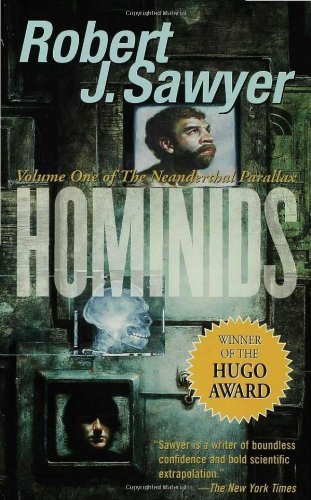
Part of Series
In the Hugo-Award winning Hominids, Robert J. Sawyer introduced a character readers will never forget: Ponter Boddit, a Neanderthal physicist from a parallel Earth who was whisked from his reality into ours by a quantum-computing experiment gone awry - making him the ultimate stranger in a strange land. In that book and in its sequel, Humans, Sawyer showed us the Neanderthal version of Earth in loving detail - a tour de force of world-building; a masterpiece of alternate history. Now, in Hybrids, Ponter Boddit and his Homo sapiens lover, geneticist Mary Vaughan, are torn between two worlds, struggling to find a way to make their star-crossed relationship work. Aided by banned Neanderthal technology, they plan to conceive the first hybrid child, a symbol of hope for the joining of their two versions of reality. But after an experiment shows that Mary's religious faith - something completely absent in Neanderthals - is a quirk of the neurological wiring of Homo sapiens brains, Ponter and Mary must decide whether their child should be predisposed to atheism or belief. Meanwhile, as Mary's Earth is dealing with a collapse of its planetary magnetic field, her boss, the enigmatic Jock Krieger, has turned envious eyes on the unspoiled Eden that is the Neanderthal world . . . Hybrids is filled to bursting with Sawyer's signature speculations about alternative ways of being human, exploding our preconceptions of morality and gender, of faith and love. His Neanderthal Parallax trilogy is a classic in the making, and here he brings it to a stunning, thought-provoking conclusion that's sure to make Hybrids one of the most controversial books of the year.
Author

Robert J. Sawyer is one of Canada's best known and most successful science fiction writers. He is the only Canadian (and one of only 7 writers in the world) to have won all three of the top international awards for science fiction: the 1995 Nebula Award for The Terminal Experiment, the 2003 Hugo Award for Hominids, and the 2006 John W. Campbell Memorial Award for Mindscan. Robert Sawyer grew up in Toronto, the son of two university professors. He credits two of his favourite shows from the late 1960s and early 1970s, Search and Star Trek, with teaching him some of the fundamentals of the science-fiction craft. Sawyer was obsessed with outer space from a young age, and he vividly remembers watching the televised Apollo missions. He claims to have watched the 1968 classic film 2001: A Space Odyssey 25 times. He began writing science fiction in a high school club, which he co-founded, NASFA (Northview Academy Association of Science Fiction Addicts). Sawyer graduated in 1982 from the Radio and Television Arts Program at Ryerson University, where he later worked as an instructor. Sawyer's first published book, Golden Fleece (1989), is an adaptation of short stories that had previously appeared in the science-fiction magazine Amazing Stories. This book won the Aurora Award for the best Canadian science-fiction novel in English. In the early 1990s Sawyer went on to publish his inventive Quintaglio Ascension trilogy, about a world of intelligent dinosaurs. His 1995 award winning The Terminal Experiment confirmed his place as a major international science-fiction writer. A prolific writer, Sawyer has published more than 10 novels, plus two trilogies. Reviewers praise Sawyer for his concise prose, which has been compared to that of the science-fiction master Isaac Asimov. Like many science fiction-writers, Sawyer welcomes the opportunities his chosen genre provides for exploring ideas. The first book of his Neanderthal Parallax trilogy, Hominids (2002), is set in a near-future society, in which a quantum computing experiment brings a Neanderthal scientist from a parallel Earth to ours. His 2006 Mindscan explores the possibility of transferring human consciousness into a mechanical body, and the ensuing ethical, legal, and societal ramifications. A passionate advocate for science fiction, Sawyer teaches creative writing and appears frequently in the media to discuss his genre. He prefers the label "philosophical fiction," and in no way sees himself as a predictor of the future. His mission statement for his writing is "To combine the intimately human with the grandly cosmic." http://us.macmillan.com/author/robert...

